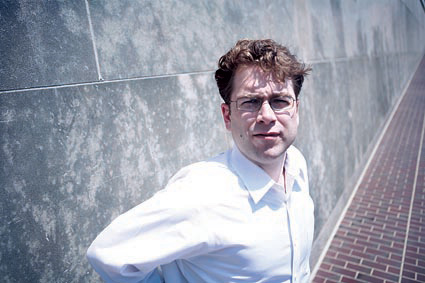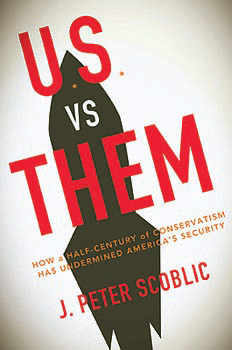By his own admission, Peter Scoblic was a tad aimless during his freshman year at Brown. A graduate of Milton Academy just outside Boston, he did what a lot of students do when they get to college: he took advantage of the freedom to party. n But he also enrolled that year in Political Science 40, Conflict and Cooperation in International Relations, the course that would determine his career. PS 40 was taught by Eric Nordlinger, who would die of pancreatic cancer in 1994. Nordlinger, according to a 1986 BAM article, had "a reputation for being arrogant—brilliant, uncompromising, and very very sure of himself." Nordlinger was known for encouraging both rigor and independent thinking among his students. Although this was intimidating to many, Scoblic liked PS 40 so much that he signed up the next year for American Foreign Policy Since 1945, another Nordlinger offering. Soon he was spending much of his free time soliciting articles for the Brown Journal of World Affairs, coediting three issues ("Macho Policy Geeks " ).

Stimulated by Nordlinger's teaching, Scoblic took a particular interest in nuclear weapons. One of his PS 40 papers asked whether such weapons really gave the United States a decided advantage in conducting foreign policy. His interest in nuclear weapons policy eventually earned him a job editing the monthly journal Arms Control Today. He was twenty-five years old. "This is serious stuff," Scoblic remembers thinking at the time. "This is a professional journal about weapons of mass destruction. It's read by diplomats and weapons inspectors and people on Capitol Hill who do this for a living." After he became editor, Scoblic says, a number of staff members left for other jobs. (One of the people he hired to replace them was also a veteran of the Brown Journal of World Affairs.) In addition to having to hire a new staff, he says, he realized he had taken over a publication that was three months behind schedule.
Whatever prestige Arms Control Today may have had among nuclear weapons specialists, editing it was not exactly a high-visibility publishing job. Not, at least, until 9/11 and the Bush administration's buildup to the war in Iraq, a war premised on Iraq's possession of weapons of mass destruction. "Before 9/11," Scoblic says, "you would say at a cocktail party that you work for Arms Control Today and people would be bored. But after 9/11, people would respond by asking, 'How scared should I be?'''
Scoblic wasn't quite sure himself. Like many nuclear weapons thinkers, he'd been startled by George W. Bush's nuclear policy and his general tendency to pull out of international agreements—what Scoblic would later call in the New Republic the president's "treaty-killing spree." In the first nine months of his term, Scoblic says, Bush "was pushing ahead full-force with nuclear defense and pulling out of the Kyoto Protocol and the International Criminal Court. He was clearly acting in a unilateralist manner." Although Scoblic wasn't pleased about this direction in foreign policy, he believed at the time that the members of the administration "were defending the United States in the way they thought best."
After the 9/11 attacks, Scoblic immediately sensed that curbing nuclear proliferation would have to become Bush's top foreign-policy priority. After all, the United States could not afford to have loose weapons of mass destruction getting into the hands of terrorists. But that's not what the members of the Bush administration did, Scoblic believes.
"They moved to trim some funding from agreements to control loose nuclear material." Even more confusing to Scoblic was the focus on Iraq. "In the late summer and fall of 2002," he says, "we learned that Iran had a secret uranium enrichment program and that North Korea probably had one. When the administration confronted North Korea about this, North Korea pulled out of a nonproliferation program, which gave that country the ability to quickly make nuclear weapons." It seemed to Scoblic that as far as nuclear threats to the United States were concerned, "North Korea should have been first, Iran second, and Iraq third."

Yet Bush chose to invade Iraq. "The administration seemed not that concerned about North Korea and Iran," Scoblic says. "I couldn't understand why they were prioritizing Iraq and dealing with Iran and North Korea in such a bizarre fashion. Sure, Saddam Hussein was this evil guy. But as we continue to learn, North Korea is one of the worst nuclear proliferators in the world, and Iran is a much greater supporter of terrorism in the world than Iraq is."
Why was the Bush administration acting this way? What was driving its thinking? Scoblic began spending most of his time trying to answer that question.
Then, one day in 2003, New Republic editor Peter Beinart phoned Scoblic to invite him to join the magazine's staff. Beinart had earlier interviewed Scoblic for the foreign editor job at the magazine, but when the job was offered to another editor, Scoblic figured that was the end of it. Going to the magazine was intimidating, Scoblic says. "It was also exciting. And there was a very, very steep learning curve. First, I was going from a monthly to a weekly. The turnaround time for an article was incredibly fast. And I'd also been focused on this very tiny niche. One of the first pieces I edited was a long piece about the potential for deflation in the U.S. economy. And I didn't know a thing about deflation."
A year later, the executive editor quit, and Scoblic was promoted into the second-most important editorial position at the New Republic. Not long after that, Beinart went off to promote a new book, and for nine months Scoblic served as acting editor.
Meanwhile, Scoblic had begun working on his own book, which was focused on Bush's foreign policy. U.S. vs. Them: How a Half Century of Conservatism Has Undermined America's Security was published by Viking in May of this year. In it, Scoblic argues that, far from being surprising or irrational, the administration's actions in Iraq and its foreign policy in general are rooted in a particular strain of Manichaean thought that can be traced back at least to the writings of a young William F. Buckley Jr., who once wrote about the Cold War: "I myself believe that the duel between Christianity and atheism is the most important in the world. I further believe that the struggle between individualism and collectivism is the same struggle reproduced on another level."
For many conservatives, the world is a hostile environment for the United States, whose exceptional status gives it great moral authority. Some conservatives see this as a justification for isolationism, but not the conservatives known today as neocons. Far from retreating into isolationism, they and other conservative subgroups believe that the country should actively confront and resist evil wherever it can. If other countries wish to join the United States on this mission, that's all well and good. But the nation must not be afraid to act unilaterally. Accommodation with evil regimes can only result in the spread of evil. To such conservatives, President Eisenhower, despite being a Republican and a war hero, was a great disappointment for his "containment" of the Soviet Union during the Cold War. (Buckley believed Eisenhower had a "deficient understanding" of communism.) "Unilateralism," Scoblic says, "is really isolationism turned inside out."
John F. Kennedy was even worse. Kennedy's resolution of the Cuban missile crisis—what Scoblic calls "the most dangerous episode in human history"—is widely admired as a triumph of brinksmanship and compromise. Kennedy himself believed that there was a one-in-three or a one-in-two chance that the crisis would result in a war between the United States and the Soviet Union. It was estimated at the time that a nuclear exchange between the two superpowers would have killed 100 million Americans. Yet Barry Goldwater believed Kennedy's solution of the crisis was a travesty. Scoblic quotes Goldwater as saying, "We locked Castro's communism into Latin America and threw away the key." At the 1964 Republican national convention, Goldwater famously said that "extremism in the defense of liberty is no vice [and] moderation in the pursuit of justice is no virtue." The rhetoric is similar to that of George W. Bush, who more than any other president has based his foreign policy on such uncompromising views.
Yet Goldwater's outlook did not materialize out of thin air. In U.S. vs. Them, Scoblic traces it as far back as the European settlement of the New World. The early settlers were not only fleeing religious persecution; they believed they were practicing a more righteous form of Christianity. To them, the New World would be spiritually truer than the Old World. "The country," Scoblic says, "was really founded with an exceptionalist attitude. Some of the first settlers saw the United States as a New Israel ordained by God to establish a new society in opposition to the apostasy of the Old World. That's a very powerful sentiment." Even as the nation became secularized, Scoblic says, the sentiment served to "reinforce the country's sense of being exceptional, of being apart."
Nixon disappointed many conservatives, of course, by reaching out to China, and although it is almost a matter of faith among conservatives that President Reagan's uncompromising embrace of U.S. exceptionalism led to the collapse of the Soviet Union, Scoblic believes this is wishful thinking. It is indeed true, he writes, that Reagan, particularly during his first term, was masterly in using the rhetoric of good and evil, as when he called the Soviet Union the evil empire. Also during this time a conservative skepticism blossomed toward the CIA's dispassionate analysis of intelligence. Intelligence should be ideological: its purpose is to further democracy and defeat evil regimes. In this way, these conservatives have an almost semiotic view of intelligence: objective truth is an illusion, and even the CIA can put forward only its own subjective view of the truth. "Reagan's first term," Scoblic writes in U.S. vs. Them, "was a battle between the administration's pragmatists and its conservatives, who mastered the disingenuous art of advocating progress while doing everything possible to undermine it."
But Reagan himself became increasingly worried about nuclear war. As Scoblic reports, by the end of 1983 polls showed that 83 percent of Americans supported the Nuclear Freeze movement. Reagan seems to have been particularly affected by watching the TV movie The Day After, which depicted the aftermath of nuclear war. "In his memoirs," Scoblic notes, "he reflected that the movie left him 'greatly depressed' and made him 'aware of the need for the world to step back from the nuclear precipice.'" At first his conservative advisers tended to ignore this side of the president. But even earlier, while in the hospital recovering from John Hinkley's attempt to kill him, Reagan told Terrence Cardinal Cooke, Scoblic writes, "that God had spared his life so that he might 'reduce the threat of nuclear war.' … It became clear to his aides and later to his biographers that Reagan believed literally in the end of the world as foretold in Revelations, that Armageddon would come about through nuclear war, and that it was his responsibility to stop it."
Though the Soviet Union's Mikhail Gorbachev did not share Reagan's religious views, the two men found common ground in the wish to make the world safe from nuclear weapons. In 1987, after much negotiation, Reagan and Gorbachev signed the Intermediate Nuclear Forces treaty, which eliminated all medium-range nuclear and conventional missiles. "By the end of his second term," Scoblic writes, "Reagan's foreign policy had become the antithesis of everything conservatives believed." William F. Buckley Jr.'s National Review ran a cover story about the INF treaty titled "Nuclear Suicide."
Clearly, Scoblic writes, not until George W. Bush did conservatives finally have their man in power. "In foreign policy terms," Scoblic writes, "Bush was far more conservative than Reagan. Although Reagan had spoken in terms of good and evil, he had not followed that worldview to its logical end, dismissing the notion of nuclear war and ultimately negotiating with the Soviet Union. By contrast, even before 9/11, Bush had embraced the utility of nuclear weapons and had shied away from negotiations.... The September 11 attacks reinserted the good-versus-evil trope into U.S. foreign policy, allowing conservatives—and George W. Bush in particular—to reach their true potential."
Although conservatives rejoiced over the end of the Cold War during the Reagan years, the downfall of communism also contained a threat. Scoblic quotes Richard Viguerie, whose direct-mail strategy during the 1980s helped propel the "New Right" into power. Shortly after the fall of the Berlin Wall, Viguerie told Newsweek: "At the core of 75 percent of conservative thinking and action is anti-communism. You take that away and you take away the glue that has held the movement together for a generation." At about the same time, Francis Fukuyama wrote a landmark article arguing that with the collapse of the Soviet Union the world had reached "the end of history." One diplomat noted that conservatives were now suffering from "enemy-deprivation syndrome."
Some conservatives were relieved. Jeane Kirkpatrick wrote that "with a return to normal times, we can again become a normal nation." Others urged a different approach. The American Enterprise Institute's Ben Wattenberg noted that "Americans have a missionary streak and democracy is their mission." These conservatives believed that not all evil had been defeated with the Soviet Union. "Most second-generation neoconservatives," Scoblic writes, "embraced democratization as the logical ideological successor to anticommunism."

Much of the language of the Cold War was adapted to this new cause. In 2000, William Kristol and Robert Kagan published a collection of neocon essays called Present Danger. "The editors emphasized the evil of our enemies," Scoblic wrote, "and derided the notion of 'engagement,' a term they placed in dismissive quotation marks, just as Goldwater had done with 'negotiation.' They wrote, 'When it comes to dealing with tyrannical regimes, the United States should seek not coexistence but transformation.'" As President Bush noted during the 2000 presidential campaign, "The Evil Empire has passed, but evil remains."
So why Iraq? "I think what you see [with the Bush administration] is a preference for military action," Scoblic says, "because it allows you to actually defeat evil, to vanquish it. Iraq to conservatives was a really painful example of the policy of coexistence with evil. Containment of Iraq meant that we had to endure Saddam Hussein and endure his relatively frequent provocations. He was a constant reminder of the moral inadequacy of containment and the humiliation of U.S. power. Here we are the most powerful nation in the world, and we just can't control this guy. And out of Iran, North Korea, and Iraq, Iraq was the most invadable."
Scoblic explains his own view of the invasion this way: "I had a very complicated position," he says. "I felt Congress needed to authorize the use of force, because the ability to threaten military action is essential to making diplomacy work and to getting the inspectors back into the country. The point here was to prevent them from having a nuclear program. And apparently we had prevented Saddam Hussein from having a nuclear program. Had we been able to establish that fact, we would no longer have needed to invade."
In Scoblic's view, Bush, like Reagan before him, has become more compromising during his second term. In September 2005, the administration, rather than invade North Korea, signed an agreement to provide fuel and money in exchange for shutting down its nuclear program. Similarly, in 2006 Condoleezza Rice announced that if Iran would suspend enrichment of uranium, the United States would join the European Union in discussing Iran's entire nuclear program. The next year, U.S. and Iranian diplomats met to discuss how to stabilize Iraq. Many conservatives were not happy.
The most important problem Scoblic sees in this conservative approach to foreign policy is that it has actually weakened U.S. national security. The country's leadership, he believes, has taken exactly the opposite approach to the one needed to combat terrorism. "Common sense," he writes in the concluding pages of U.S. vs. Them, "suggests that the United States cannot remain committed to a nationalistic foreign policy when the chief threats we face are transnational in nature. America survived a fragile infancy that necessitated an us-versus-them worldview, which enabled it to grow into the world's preeminent state. Conservatives still cling dogmatically to the view that to become entangled with other states would grievously undermine our security—that Gulliver would be brought down by the Lilliputians ... It is nothing short of remarkable that while the planet itself is under assault from climate change, conservatives refuse to countenance internationally binding commitments to cap carbon emissions. At such irrational extremes, conservatism threatens to become an ideology of suicide."
The United States, Scoblic argues, will regain its stature by exercising more "soft" power and by more concretely identifying threats and battling them in cooperation with other countries. "Conservatives are right," Scoblic notes. "There is evil in the world—and there always will be. All we can do to counter it is identify the threat that it poses to the United States and minimize it ... Defending the national interest ought be an empirical, not an ideological pursuit. When the national interest is cast in ideological terms, it is usually miscast—broadened, amplified, and distorted. When conservatives ... define regimes that seek weapons of mass destruction as the chief threat, rather than the nuclear weapons themselves, they promote unnecessary war. When they define the national interest as the victory of democracy over Islamic jihadism, they elevate the threat we face to a struggle between civilizations and, ironically, make victory impossible."
Norman Boucher is editor of the BAM.




